Lección 10 - Hablar del pasado
Conversaciones
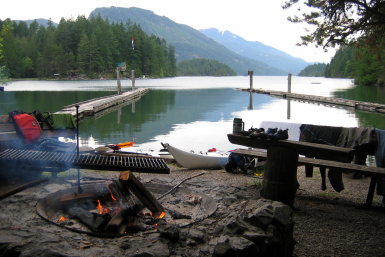
English
Eric phones Tom to tell him about his vacation at a nearby lake.
Eric: Hi Tom. How's it going?
Tom: Good. How was your vacation?
Eric: Great! We went hiking in the forest, and kayaking around the lake. We were very lucky with the weather, it was sunny and warm every day.
Tom: How many people were there?
Eric: There were five of us.
Tom: Where did you stay?
Eric: We rented a cabin at the south end of the lake. It was right on the lake, with a small beach in front. It came with a kayak and wood for the fire pit on the beach. I had such a great time that I want to go again next summer. Maybe you can come with us next time.
Tom: That sounds great!
Español
Eric telefonea a Tom para contarle sus vacaciones en un lago cercano.
Eric: Hola Tom. ¿Cómo te va?
Tom: Bien. ¿Como fueron tus vacaciones?
Eric: ¡Excelente! Fuimos de caminar por el bosque y en kayak alrededor del lago. Tuvimos mucha suerte con el clima, hacía sol y cálido todos los días.
Tom: Cuántas personas estaba allí.
Eric: Éramos cinco.
Tom: ¿Dónde te alojaste?
Eric: Alquilamos una cabaña en el extremo sur del lago. Estaba justo en el lago, con una pequeña playa en el frente. Vino con un kayak y madera para el pozo de fuego en la playa. Lo pasé tan bien que quiero volver el próximo verano. Tal vez puedas venir con nosotros la próxima vez.
Tom: ¡Eso suena genial!
Vocabulario y Frases
 How many people were there?
How many people were there?
|
Cuántas personas estaba allí. |
 at a nearby lake
at a nearby lake
|
en un lago cercano |
 We went hiking in the forest, and kayaking around the lake.
We went hiking in the forest, and kayaking around the lake.
|
Nos fuimos de excursión en el bosque, y en kayac por el lago. |
 beach
beach
|
playa |
 cabin
cabin
|
cabina |
 to phone
to phone
|
llamar por teléfono |
 to tell
to tell
|
decir, informar |
 fire pit
fire pit
|
pozo de fuego |
 kayak
kayak
|
kayac |
 lucky
lucky
|
afortunado |
 to rent
to rent
|
alquilar |
 to come with
to come with
|
venir con |
 south
south
|
sur |
 to stay
to stay
|
quedarse |
 vacation
vacation
|
vacaciones |
 wood
wood
|
leña, madera |
Anuncio
Weather
 weather
weather
|
el tiempo |
 cloud
cloud
|
nube |
 heat
heat
|
calor |
 rain
rain
|
lluvia |
 snow
snow
|
nieve |
 storm
storm
|
tormenta |
 sun
sun
|
sol |
 wind
wind
|
viento |
 How's the weather?
How's the weather?
|
¿Qué tiempo hace? |
 It's a beautiful day.
It's a beautiful day.
|
Es un día bonito. |
 It's cold.
It's cold.
|
Hace frío. |
 It's cool outside.
It's cool outside.
|
Es frío fuera. |
 It's foggy.
It's foggy.
|
Hay niebla. |
 It's hot.
It's hot.
|
Hace calor. |
 It's humid.
It's humid.
|
Es húmedo. |
 It's raining.
It's raining.
|
Está lloviendo. |
 It's snowing.
It's snowing.
|
Está nevando. |
 It's stormy.
It's stormy.
|
Está tormentoso. |
 It's sunny.
It's sunny.
|
Está soleado. |
 It's windy.
It's windy.
|
Hace viento. |
 It's very windy today.
It's very windy today.
|
Hace mucho viento hoy. |
 The weather's bad.
The weather's bad.
|
El tiempo es malo. |
 The weather's nice.
The weather's nice.
|
El tiempo es bonito. |
 It's supposed to be nice tomorrow.
It's supposed to be nice tomorrow.
|
Se supone que es agradable mañana. |
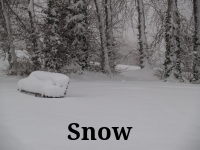
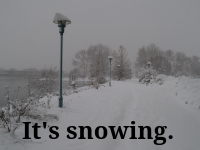
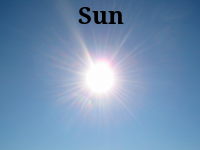

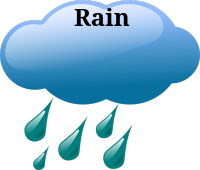
Flashcards
Aquí hay algunas flashcards para ayudarte a aprender como hablar sobre el clima en inglés.
Gramática
Past Tense of Verbs
'The past tense' de los verbos, también llamado 'simple past tense', describe una acción, un acontecimiento o un estado emocional pasados. 'The past tense' es similar al pretérito en español. La mayoría de los verbos forman 'the past tense' agregando el sufijo ed al final de un verbo. Por ejemplo, 'the past tense' de walk es walked.
Ejemplos
| I walked to the park yesterday. | Caminé hasta el parque ayer. |
| She talked about her vacation. | Habló de sus vacaciones. |
| He closed the door. | Cerró la puerta |
| They talked about the cabin. | Hablaron sobre la cabina. |
| We hoped for the best. | Nos esperaba lo mejor. |
| The clouds drifted away. | Las nubes se alejaron. |
Irregular Verbs in the Past Tense
Muchos verbos muy comunes en inglés tienen un 'past tense' irregular. Esta lección tratará algunos de estos verbos irregulares muy comunes. La próxima lección tratará también algunos otros verbos irregulares.
To Be
El verbo be es el más irregular en inglés. Tiene dos formas de 'past tense'. La siguiente tabla muestra 'the past tense' para el verbo be.
| I was | estuve, fui |
| he was | estuvo, fue |
| she was | estuvo, fue |
| it was | estuvo, fue |
| we were | estuvimos, fuimos |
| you were | estuviste, estuvisteis, fuiste, fuisteis |
| they were | estuvieron, fueron |
Ejemplos
| I was at the store. | Yo estaba en la tienda. |
| He was tired. | Él estaba cansado. |
| They were happy. | Ellos eran felices. |
| We were at home. | Estábamos en casa. |
| Were they at the beach? | ¿Estaban en la playa? |
| They were not at the beach. | No estaban en la playa. |
| The car was dirty. | El coche estaba sucia. |
| The windows were dirty. | Las ventanas estaban sucias. |
Otros verbos irregulares
La siguiente tabla muestra algunos verbos muy comunes que son irregulares en 'the past tense'. La lección 11 cubrirá incluso más verbos irregulares.
| Verb | Past Tense | |
|---|---|---|
| do | did | hacer |
| have | had | tener |
| go | went | ir |
| sleep | slept | dormir |
| come | came | venir |
| give | gave | dar |
| find | found | encontrar |
| think | thought | pensar |
Ejemplos
| They went to the store last week. | Fueron a la tienda la semana pasada. |
| He thought about it. | Pensó en ello |
| I slept all night. | Dormí toda la noche. |
| We did the work. | Hicimos el trabajo. |
| They found it. | Lo encontraron. |
| She found the book. | Encontró el libro. |
| I did the dishes. | Hice los platos. |
| They slept on the floor. | Dormían en el suelo. |
Questions and Negative Statements with the Past Tense
Para ambas preguntas y declaraciones negativas, 'the past tense' del verbo auxiliar do se usa junto con el verbo, similar a cómo do se usa como un verbo auxiliar al hacer preguntas o hacer declaraciones negativas en 'the present tense'.
Nota: Did not a menudo se acorta a didn't.
Ejemplos
| Did they go to the store? | ¿Van a la tienda? |
| They did not go to the store. | Ellos no van a la tienda. |
| They didn't go to the store. | Ellos no van a la tienda. |
| Did you sleep all night? | ¿Has dormido toda la noche? |
| I did not sleep all night. | No dormí en toda la noche. |
| Did she find the book? | ¿Encontró el libro? |
| She did not find the book. | She did not find the book. |
| Did you buy it? | ¿Lo compraste? |
| We did not buy it. | No nos compramos. |
| They did not do it. | Ellos no lo hicieron. |
Un número muy pequeño de verbos, como be, no use un verbo auxiliar al hacer una pregunta o hacer una declaración negativa. Los siguientes ejemplos muestran cómo hacer preguntas y hacer declaraciones negativas con el verbo be.
| Were you tired? | ¿Estabas cansado? |
| I was not tired. | No estaba cansado. |
| I wasn't tired. | No estaba cansado. |
| Was the house for sale? | ¿La casa estaba en venta? |
| The house was not for sale. | La casa no estaba en venta. |
| The house wasn't for sale. | La casa no estaba en venta. |
| Were the dishes clean? | ¿Estaban limpios los platos? |
| The dishes were not clean. | La vajilla no estaba limpia. |
| The dishes weren't clean. | La vajilla no estaba limpia. |
Anuncio
Leer Ingles
Chapter 1 - The Airport
Ana and Alejandro Martinez walk off the plane and into the airport. Both are tired from the flight, but also excited to be in a new country. They follow the crowd of people until they get to the lineup for customs. After about ten minutes, it is their turn to talk with the customs agent.
"Hello," Ana says as she gives the customs officer her passport.
"What is the purpose of your visit?" asks the customs officer.
"We are taking a course to help us improve our English."
"How long will you be staying in Vancouver?"
"We plan to stay until September fifth."
"Where are you staying?"
"We have friends who live here," Alejandro answered. "We met them when they visited our country. They invited us to stay with them for the summer, and recommended a course for us to take."
"What is your relationship?"
"Ana is my sister," Alejandro replied.
The customs officer gave them back their passports and said, "Enjoy your stay."
"Thank you", Ana and Alejandro said at the same time, then went to find their luggage.
They stood by the luggage carousel and waited for their luggage. "Is that your suitcase?" Ana said pointing at a black suitcase.
Alejandro looked at it. "I don't think so, but here is yours."
Ana grabbed her suitcase as it came by. A couple minutes later Alejandro got his suitcase as well.
"Now where do we go?", Ana asked.
"I think we need to go this way," Alejandro replied, pointing to the left.
They walked through a small passage and into a large waiting area.
"Alejandro! Ana!" they heard someone call.
Ana and Alejandro looked and saw their friends Sarah and Eric. They waved and walked over to them.
"Hi!" Sarah said. "How was the flight?"
"Long," said Alejandro. "But there were no problems."
"Let's go," Eric said, "We'll take you back to our house, and make dinner while you get settled in."
The four of them walked out of the airport, and into the sunny evening.
Vocabulario inglés
| plane | avión |
| airport | aeropuerto |
| tired | cansado |
| flight | vuelo |
| excited | emocionado |
| country | país |
| crowd | multitud |
| lineup | alineación |
| customs | aduana |
| minute | minuto |
| purpose | motivo |
| visit | visita |
| improve | mejorar |
| until | hasta |
| answers | responde |
| summer | el verano |
| recommended | recomendaron |
| relationship | relación |
| Enjoy your stay. | Disfruta sus estancia. |
| luggage | equipaje |
| suitcase | maleta |
| grabbed | agarró |
| pointing | apuntando |
| passage | pasillo |
| get settled in | instalarse en |
Practicar
Cambia cada frase para que utilice el tiempo pasado.
Ejemplo. Pregunta: I do the work. Respuesta: I did the work.
| I want to go to the store. | |
| The boy is sad. | |
| She doesn't want a coffee. | |
| Do you have a pen? | |
| They walk to the park. |
Escribe sobre tus vacaciones favoritas, o unas vacaciones que te gustaría ir.
Examen
Haz el examen en línea para ver qué tan bien sabes 'the past tense' en inglés.

